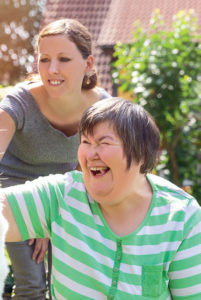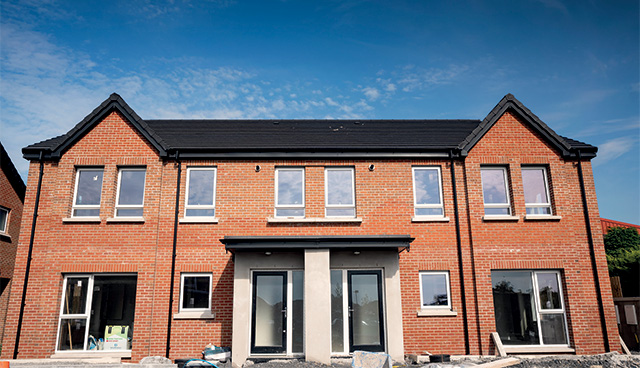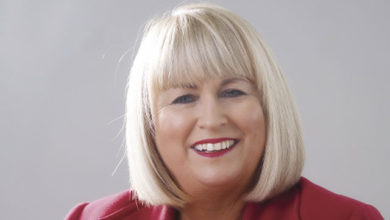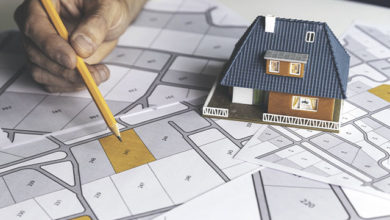Squaring the Circle: South Ulster Housing Association on the Challenges of Social Housing

No-one will disagree about the need for a significant increase in the supply of social housing in Northern Ireland. But, as Angela Clarke, Chair of South Ulster Housing Association knows, increasing supply is not just a numbers game.
“We need to be able to deliver the right mix of homes — in terms of quality, tenure and type – and in the right location. The demand is there, and so is the need. That’s the circle we’re always trying to square,” she says.
Angela is in the second year of her tenure as Chair. A retired senior civil servant, she joined the board of SUHA about four years ago. During her professional career, she worked in numerous policy areas, including housing, regeneration and welfare policy — all of which have proved relevant in her current role, and in the work of the Association.
The supply of new homes is a collaborative effort involving many stakeholders. Chief Executive Kieran Matthews emphasises that “without the support from a host of organisations, such as the Department for Communities, NI Housing Executive, funders, councils, providers of infrastructure services, contractors, developers, other housing associations and the NI Housing Association Federation, we would not be able to provide and maintain homes for our Tenants”.
SUHA was formed back in 1978 as the Portadown Housing Association. It has since grown into one of the larger associations in Northern Ireland, delivering essential, community-based housing across the country. And the Association’s geographic reach is expanding too, with homes from Newry to a new development on site in Derry/Londonderry.
More than a landlord
South Ulster Housing Association positions itself as ‘more than a landlord’. What does this mean in practice? “It means putting our tenants’ voice at the heart of what we do,” Angela says, “delivering good homes and services, supporting communities — and, ultimately, improving lives.
“Tenant involvement and participation is a crucial part of this strategy, and we want to increase the capacity of tenants to drive service delivery,” she says. “To this end, our Tenants Forum receives support and training in organising meetings and delivery of scrutiny work, including value for money efficiency reviews.”
Homes make communities
At SUHA they therefore recognise that the Association has an important role in ‘place-shaping’. In addition to delivering modern, safe, sustainable and well-maintained homes, the Association has a stated goal of wanting to go further, creating places that feel welcoming and where people want to live and feel proud to live in.
Of course, that ambition is not something that can be achieved alone. It, again, requires partnership both at a strategic and operational level, drawing on others’ knowledge, experience and capacity in order to deliver more together. SUHA’s current partnership arrangements involve contractors, lenders, NIHE and the regulator, but the Association is also keen to continue to work more closely with local councils in areas where they provide housing.
“We will also ensure to maintain existing relationships with our Joint Managing Partners, Praxis Care and Inspire Wellbeing, for supported housing,” Angela explains. “We’ll also continue to develop our partnership arrangements, such as Wade Training, who provide training for tenants; APAC, who work with vulnerable families; BCM Housing Support, who provide assistance for older tenants, and Citizens Advice for debt advice.”
Integrated solutions to complex issues
 The challenges facing the sector in general — availability of land, planning, funding, infrastructure — in the face of mounting demand and changing demographics all make for a particularly complex and challenging situation. The government’s welfare reform programme has presented a significant challenge for social housing as well.
The challenges facing the sector in general — availability of land, planning, funding, infrastructure — in the face of mounting demand and changing demographics all make for a particularly complex and challenging situation. The government’s welfare reform programme has presented a significant challenge for social housing as well.
There can be specific socio-cultural considerations involved too. When a home becomes available, people on a waiting list may not want to move a short distance if it means leaving a community where they feel comfortable. More circle-squaring.
The solution, Angela Clarke maintains, lies in a more integrated, joined-up approach involving policy-makers, investors, developers and regulators.
We also have to discuss the elephant in the living room — in everyone’s living room: the impact of Covid-19.
“The pandemic has been an exceptionally difficult and worrying time – for everyone. For our tenants, we made sure that they knew we were still there for them when they needed us,” Angela says. “The staff made great efforts to contact every tenant personally and regularly to offer support and check they were OK. If people had a maintenance issue, we wanted them to know they should still let us know so we could sort it out.”
Obviously the pandemic has dominated every aspect of life in the past year. From an operational point of view, the impact on SUHA will be on planning. In the short term, the Association is working on the basis that government restrictions will continue in some measure, probably for the next six to twelve months. Strategic objectives remain largely on course but timescales for development and planned maintenance programmes have been extended. There has been some impact on operational revenues and costs, which have been absorbed. Where there have been ramifications on development costs, it’s hoped these may be offset by additional grant funding.

A new key objective
There has been an additional key development in the Association’s strategic objectives. In 2018 SUHA defined a set of five:
- placing the voice of tenants at the heart of the organisation
- demonstrating excellent governance
- building and maintaining high-quality homes
- delivering great services that provide value for money
- support vibrant and sustainable communities
To these it has now added a new one: - developing new income streams to meet the challenges ahead.
This is perhaps SUHA’s most ambitious move to date. As Angela Clarke explains, “Right now we’re working on setting up a private development wing. This will provide a new revenue stream and enable us to build more units. It’s a complicated process but we’re confident we’ll be able to launch a pilot scheme soon. If that’s successful, it will be extended and, we hope, see it become a pipeline that delivers affordable, highquality homes for more people.”
Next steps: continued expansion — and a re-brand
And what about the Association’s other plans for the future? “We have a very ambitious agenda. We’re continuing to expand — we now have homes in Belfast, Lisburn, Glenavy, Bangor, Newtownards and the north-west. That continued expansion beyond our south Ulster base made us realise it was time to look at our name.
And so we’re about to reveal our new branding very soon — one that reflects more accurately who we are today and what we do — rather than where we operate. Watch this space!”
South Ulster Housing Association
18-22 Carleton Street
Portadown BT62 3EN
www.southulsterhousing.org






